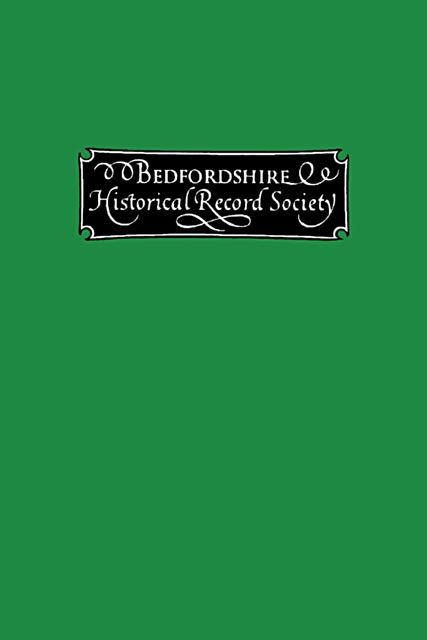Book contents
- Frontmatter
- Contents
- Abbreviations and Symbols
- The Shefford Beaker: circa 1800 B.C.
- The Morteyn Family in Bedfordshire
- The Shire of Bedford and The Earldom of Huntingdon
- The Later Descent of Wingate of Harlington
- The Disseisins by Falk de Breauté at Luton
- An Elizabethan Inquisition Concerning Bondmen
- Roll of The Justices in Eyre, 1240
- A List of Bedfordshire Apprentices: 1711 - 1720
- The Commune of Bedford
- Addendum I. “The Shire of Bedford and The Earldom of Huntingdon.”
- Addendum II. “The Disseisins of Falk de Breauté.”
- A Hand List of The Bedfordshire County Muniments : Prepared by The County Records Committee
- Index
Addendum II. - “The Disseisins of Falk de Breauté.”
Published online by Cambridge University Press: 14 July 2023
- Frontmatter
- Contents
- Abbreviations and Symbols
- The Shefford Beaker: circa 1800 B.C.
- The Morteyn Family in Bedfordshire
- The Shire of Bedford and The Earldom of Huntingdon
- The Later Descent of Wingate of Harlington
- The Disseisins by Falk de Breauté at Luton
- An Elizabethan Inquisition Concerning Bondmen
- Roll of The Justices in Eyre, 1240
- A List of Bedfordshire Apprentices: 1711 - 1720
- The Commune of Bedford
- Addendum I. “The Shire of Bedford and The Earldom of Huntingdon.”
- Addendum II. “The Disseisins of Falk de Breauté.”
- A Hand List of The Bedfordshire County Muniments : Prepared by The County Records Committee
- Index
Summary
It appears from a case reported by Bracton under 1220, that William Marshal duly received the manor of Luton with his wife, but that it was escheated in 1216 in consequence of his opposition to King John. At the conclusion of peace Falk (whether willingly or not) restored it to William, who re-granted it to him (on lease or farm) by charter. The transaction becomes thus somewhat clearer.
In another place Bracton reports an action for novel disseisin by Will, de Stanes against Falk for 2 carucates and a mill in Luton, under the year 1224. Falk does not appear, “and Robert de Lexinton and his fellows, who were Justices at Dunstaple to take that assise and before whom it was summoned, recall (recordantur) that that assise stood over for hearing because” etc. ; this seems to confirm the suggestion that the Rolls had been lost; if they had been accessible, the phrasing would probably have been different. A note to this case by Bracton's editor, Prof. Maitland, shows that he had detected the Inquisition by Martin de Pateshull which is dealt with on pp. 51-60 above, but that he regarded it (erroneously, as we think) as the record of the original Eyre of Martin de Pateshull and his fellows.—[G.H.F.].
- Type
- Chapter
- Information
- The Publications of the Bedfordshire Historical Record Society , pp. 183 - 184Publisher: Boydell & BrewerFirst published in: 2023

